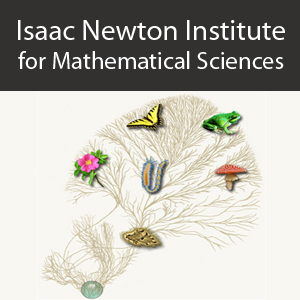A Lie algebraic classification of continuous-time Markov models
Duration: 22 mins 34 secs
Share this media item:
Embed this media item:
Embed this media item:
About this item

| Description: |
Sumner, J (Tasmania)
Thursday 23 June 2011, 11:30-11:50 |
|---|
| Created: | 2011-06-27 17:44 | ||||
|---|---|---|---|---|---|
| Collection: | Phylogenetics | ||||
| Publisher: | Isaac Newton Institute | ||||
| Copyright: | Sumner, J | ||||
| Language: | eng (English) | ||||
| Credits: |
|
||||
| Abstract: | In recent work we have discussed the importance of multiplicative closure for the Markov models used in phylogenetics. For continuous-time Markov chains, a sufficient condition for multiplicative closure of a model class is ensured by demanding that the set of rate matrices belonging to the model class form a Lie algebra. It is the case that some Markov models do form Lie algebras (eg. JC, F81, K3ST and GMM), and we refer to these models as ``Lie Markov models''. Importantly, other Markov models unequivocally do not form Lie algebras (the most conspicuous example being GTR).
The question then naturally arises: How do we generate a full list of Lie Markov models? To answer this question in full generality seems quite difficult as the interaction between the operations of a Lie algebra and the stochastic requirements of rate matrices are somewhat at odds, and it seems that this question has not been addressed in the algebraic or stochastic mathematics literature. In this talk, we will discuss how we have made signficant progress in generating Lie Markov models by demanding that the models have certain symmetrics under nucleotide permutations. >From a theoretical perspective, we show that the Lie Markov models include, and hence provide a unifying concept for, ``group-based'' and "equivariant" models, whilst also generating many other interesting examples. We also argue that our scheme is very pleasing in the context of applied phylogenetics, as, for a given symmetry of nucelotide substitution, it provides a natural hierarchy of models with increasing number of parameters. This is joint work with Jesús Fernández-Sánchez and Peter Jarvis. |
|---|---|
Available Formats
| Format | Quality | Bitrate | Size | |||
|---|---|---|---|---|---|---|
| MPEG-4 Video | 640x360 | 1.85 Mbits/sec | 313.17 MB | View | Download | |
| WebM | 640x360 | 740.11 kbits/sec | 121.97 MB | View | Download | |
| Flash Video | 484x272 | 568.88 kbits/sec | 94.03 MB | View | Download | |
| iPod Video | 480x270 | 506.3 kbits/sec | 83.68 MB | View | Download | |
| MP3 | 44100 Hz | 125.05 kbits/sec | 20.47 MB | Listen | Download | |
| Auto * | (Allows browser to choose a format it supports) | |||||

